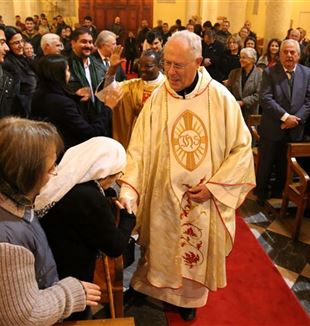
Bizzeti: "Let us not forget the Christians of Turkey"
The attack on a church in Istanbul on Sunday morning was just the latest event "in the escalation of violence in the region”, which does not only concern Ankara and its surroundings. The Apostolic Vicar of Anatolia speaks.There seems to be no peace for Christians in the Middle East. Isis has claimed responsibility for the attack on Sunday, January 28, in the Church of St Mary in Sariyer, in Istanbul. Two militiamen suddenly burst into the mass, armed, and one worshipper was killed in the shooting.
"What happened should not be surprising given the escalation of violence in the region. However, Christians, and other minorities, are doubly punished because their daily lives are not easy either. There is a widespread mistrust of them where they live and it seems that few, even in the West, take an active interest in them: not European governments, which for geopolitical issues and interests tend to look the other way, nor the leaders of Middle Eastern countries. The problem has arisen again today in a dramatic way. But Christians are an important resource even today in the Middle East.” Monsignor Paolo Bizzeti, appointed Apostolic Vicar of Anatolia in 2015 by Pope Francis and an expert on Turkey, speaks clearly. Here, the Christian presence has progressively decreased and now represents only 0.2% of the population, which is mostly Islamic.
In fact, Ankara formally protects religious freedom but in fact minorities, even among Muslims, have little space in the public sphere. This is also documented in the latest report by Open Doors, which explains how Christians, for example, have limited access to state employment while in some areas they have often found themselves crushed between rivalries between the Turkish army and Kurdish resistance groups.
"Christians in Turkey have been in the spotlight for decades even though the situation was calmer in recent years. But what happened on Sunday was perhaps part of a broader plan, if it is true, as the government in Ankara said, that 25 terrorists were arrested who had plans and maps and were planning as many attacks on other churches. But the main issue is another. We tend to only remember the Christians who live here when someone is killed, like Fr. Andrea Santoro, killed in Trebizond on February 5, 2006, while praying in church, or Monsignor Luigi Padovese, murdered on June 3, 2010, in Iskenderun. How is it that Christians in so many parts of the world forget the hard work of these brothers who courageously continue to live in the land of Saints Barnabas, Paul, Thecla and the first communities of Antioch, Iconium, Ephesus?”
Read also - Holy Land: the law of forgiveness
The Jesuit has no doubts: "We must change our mentality and become aware of the reality of minorities in the Middle East. A reality that has only worsened since the two unfortunate Gulf Wars. The appeals that St John Paul II made even then fell on deaf ears, and so did those of subsequent popes. Politics, meanwhile, has only fuelled divisions. We cannot continue to throw petrol on the fire with half-hearted political choices, siding with one faction against another and looking after our own small, particular interests. I say this to Western rulers as well. We must widen our gaze: these minorities have the right to live in safety and with real autonomy. How is it possible to live one's faith with freedom if one does not have permission to build a Catholic church or school? The faithful I meet are often frightened, and after attacks like the one yesterday, this is more than understandable. This is why I also ask the Christians of the West to make an effort for things to change, so that the mentality of rulers changes. We must pray for our brothers who live in these regions, but also take an interest in their lives, try to get to know them, welcome the Christian refugees who ask for hospitality from the European churches. They could enrich the faith of all in an unimaginable way."